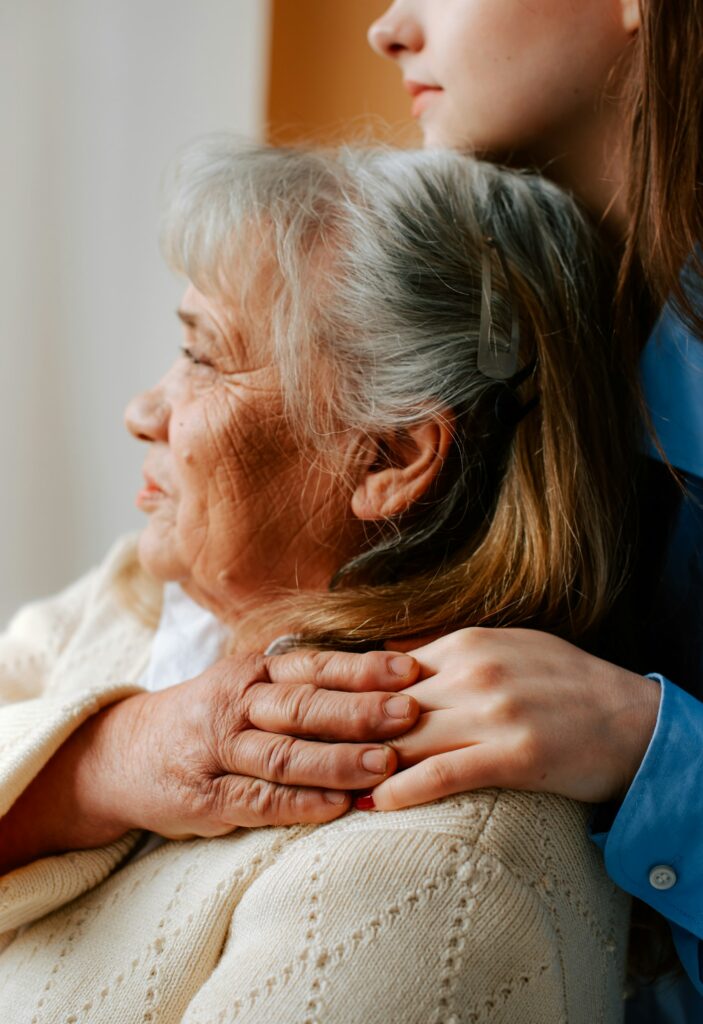If you’ve ever found yourself in the caring role – perhaps unexpectedly or gradually taking on more responsibility – you’ll know all too well that feeling of being stretched impossibly thin, caught between the pressing needs of your loved one and the relentless demands of your own life.
According to a recent study of the UK workforce, a staggering 51% say their career has been impacted by taking on responsibility for different generations of their family’s health and wellbeing. Millennial workers are particularly squeezed, with 40 per cent of those aged 25 to 44 reporting their career had suffered as a result of caring for parents, grandparents, siblings and children – truly earning their title as the ‘sandwich generation’.
The scale of informal care in Britain is enormous. A 2024 census estimated that in 2022/23 around 8% of the UK population (5.2 million people) were providing unpaid care – that’s roughly equivalent to the entire population of Scotland. These are the unsung heroes keeping our social care system from complete collapse.
The NHS has acknowledged the “vital contribution” of carers, saying it was “critical and underappreciated … not only to loved ones, neighbours and friends, but to the very sustainability of the NHS in England”. In plainer terms: without you, the whole system would crumble.
Yet this heroic effort comes at a significant personal cost. According to a sobering report by Carers UK into the state of caring in the UK and the impact it has one their health, over three quarters (79%) of carers feel stressed or anxious, half of carers (49%) feel depressed, and half of carers (50%) feel lonely. The irony isn’t lost on us – those providing such essential care often receive precious little themselves. With this in mind, here are some top tips for caregivers on how to help look after yourself…
Connect With Friends & Family
“I’m fine, really,” might be the biggest lie carers tell themselves – and others. That instinct to soldier on, to not ‘burden’ those around you with your struggles, is deeply ingrained in many of us. But here’s the truth: isolation is the silent amplifier of stress.
Some people don’t like to bother others with their problems, but it’s important to open up about your challenges. Ask for and accept help from your friends and family without the guilt that so often accompanies it. If you don’t explicitly tell them that you’re struggling or need support, they simply won’t know. Most people genuinely want to help; they’re just waiting for the green light from you.
They may be able to step in, even if it’s just to give you the space to go swimming for an hour (more on the importance of exercise shortly). A friend popping round for a cuppa while you nip out for a haircut isn’t just about the practical help – it’s about maintaining your identity beyond ‘carer’.
The numbers speak for themselves: In the aforementioned Carers UK report, 68% of carers reported that spending time with family and friends improves their wellbeing. Meanwhile, 61% said they needed more support to be able to look after their own health. That disconnect – between what helps and what’s happening – points to the difficulty many carers have in reaching out.

Organise Your Time
When the days blur into one another and you’re perpetually responding to someone else’s needs, time becomes an elusive concept. But reclaiming control of your calendar isn’t a luxury – it’s essential self-preservation.
It’s crucial to plan your time deliberately so you can carve out precious moments away from your caring responsibilities. Having a structured calendar and giving people adequate notice means you can make solid plans, creating little islands of anticipation in what can sometimes feel like an ocean of obligation.
That dental appointment you’ve been putting off? Block it in. The coffee with a friend that keeps getting cancelled? Make it non-negotiable. Those small acts of forward planning aren’t selfish – they’re survival.
Organise regular carer support, even if it’s just a couple of hours a day. Investigate whether you’re eligible for carers’ assessments, respite care or direct payments through your local council. When the pressure is mounting, it’s all too easy to let your own needs slip to the bottom of your priority list. But remember, if you’re depleted and exhausted, the quality of care you can provide inevitably diminishes too.
Being strict with your schedule isn’t rigid thinking – it’s creating protective boundaries that allow space for those all-important moments of respite. Think of it as building a pressure valve into your week that prevents the whole system from overheating.

Consider Respite Care
Here’s a striking statistic: According to the Carers Report 58% of people said that taking a break from caring improves their wellbeing. Yet so many carers push themselves to the absolute brink before even considering respite care – as though taking a breather somehow constitutes failure.
Let’s be perfectly clear: respite isn’t an indulgence; it’s essential preventative maintenance for your wellbeing. Moreover, respite care is not merely a matter of expense; it’s about supporting caregivers and maintaining quality care.
Caring for a loved one may be deeply satisfying at times, but it’s also exceptionally challenging both physically and emotionally. Respite care is short-term care designed to give family caregivers exactly that – respite – for a few hours, days, or weeks. Respite care brings a welcome breather for carers, allowing them to care better too.
The options are more diverse than many realise. Respite care services vary depending on the provider and type of care, such as in-home care where someone comes to your home, day centres providing structured activities, or short stays in nursing homes or residential care facilities while you go on holiday. You can even arrange for a volunteer to come to your home and spend a few hours with your loved one each week. Your local council, GP or organisations like Age UK can help navigate the options available in your area.



So, what’s the financial impact on families? The cost of respite care for elderly loved ones hinges on several variables, but here’s a snapshot of the average cost of respite care in the UK:
- In-Home Respite Care: Expect to pay £15–£25 per hour for a visiting carer offering companionship or personal care. For 24-hour live-in care, weekly rates for respite care typically range from £1,350 to £2,000.
- Residential Respite Care Fees: Staying in a residential care home is £1,488 per week, and in nursing homes with registered nurses, it is £1,638.
- Day Care Centres: These centres are inexpensive, averaging £50–£100 daily, and vary in activities and area.
Many carers experience profound guilt about utilising respite services, feeling they should manage everything themselves or that nobody else can provide care to the same standard. This thinking needs radical reframing: respite isn’t a luxury or an admission of failure – it’s an essential component of sustainable care. A rested, recharged carer is ultimately a more effective one.
Prioritise Your Mental Wellbeing
For carers, mental health often has to take a back seat. Many don’t have time to stop and think about it. But just like the safety demonstration on an aeroplane instructing you to put your own oxygen mask on first, you need to address your own wellbeing before you can effectively care for others.
Take a moment each day – even if it’s just five minutes – to check in with yourself. How are you really feeling? What might help ease your burden today? Sometimes simply acknowledging our struggles can lighten their weight.
Practice Relaxation & Mindfulness Techniques
The constant vigilance required when caring for someone can leave your nervous system in a perpetual state of high alert – your body flooded with stress hormones even in moments of apparent calm. It’s like having your internal alarm system permanently switched to ’emergency mode’. Over time, this takes a serious toll on both physical and mental health.
Mindfulness is all all about paying more attention to the present moment – to your own thoughts and feelings, and to the world around you. According to the NHS, Mindfulness can improve our mental wellbeing and help us enjoy life more and understand ourselves better.
Learning to deliberately activate your body’s relaxation response isn’t just nice to have – it’s a vital skill for carers that can literally change your brain chemistry. Think of it as developing an internal ‘off switch’ for when those stress responses are no longer serving you.
Simple breathing exercises can be done anywhere, at any time – while waiting for the kettle to boil, sitting in a doctor’s waiting room, or even during a difficult conversation. Try the 4-7-8 technique: breathe in for 4 seconds, hold for 7, and exhale slowly for 8. This pattern triggers your parasympathetic nervous system, helping to lower cortisol levels and create a sense of calm. The beauty is in its simplicity – no special equipment, no need to carve out huge chunks of time.
Mindfulness apps offer guided sessions tailored specifically to those with limited time and high stress. Even three minutes of focused attention on your breathing can reset your emotional thermostat and bring you back to centre. Apps like Headspace and Calm offer specific programs for carers that acknowledge both the practical constraints and emotional complexities of the caring role.
For something even simpler, try the ‘five senses check-in’: pause and notice five things you can see, four things you can touch, three things you can hear, two things you can smell, and one thing you can taste. This quick grounding exercise pulls you out of swirling thoughts and back into the present moment.
Exercise
Even if you’re feeling very low and drained mentally and physically, it’s important to take time to exercise. Physical activity doesn’t need to mean gruelling gym sessions – gentle movement is enormously beneficial for both body and mind.
A brisk 10-minute walk around the block can flood your brain with mood-enhancing endorphins. That said, it can be tricky to leace the home when your caring for someone. Consider things you can do from home, like chair you which offers gentle stretches and dancing around the kitchen to your favourite song, that counts too.
Exercise not only boosts your physical resilience but also creates mental space where problems often find their solutions. Many carers report that some of their best problem-solving happens during physical activity when their conscious mind is temporarily occupied elsewhere.
Consider A Gratitude Diary
When days seem endlessly challenging, deliberately focusing on what’s going right can provide essential psychological nourishment. Keeping a gratitude diary – noting down three things you’re thankful for each day – may seem simplistic, but research consistently demonstrates its effectiveness in elevating mood.
Your entries needn’t be profound. Perhaps you managed to enjoy a cup of tea while it was still hot, or noticed the first spring flowers emerging. Training your brain to spot positives creates new neural pathways that gradually make positivity your default setting.
Prioritise Sleep
According to the Carers report, the most commonly reported symptom was increased tiredness (88%), followed by difficulty sleeping (87%). The same report revealed that 72% of carers said that getting a good night’s sleep improves their wellbeing.
A good 7-9 hours a night ensures that we’re operating at our optimum, with sleep not only helping us recover physically, but also building better mental resilience.
Create a proper wind-down routine before bed – dim the lights, avoid screens, perhaps try a warm bath or gentle stretching. If worries about your loved one keep you awake, keep a notepad by your bed to jot them down, allowing your brain to temporarily release them.
If night-time disturbances are inevitable due to the needs of the person you’re caring for, try to establish a nap routine during the day. Even 20 minutes can help reduce sleep deficit and restore cognitive function.

Nourish Your Body
When caring responsibilities take over, nutrition often becomes an afterthought – grabbing whatever’s quick and convenient rather than what truly nourishes. Yet the quality of fuel you give your body directly impacts your energy levels, mood and resilience.
Batch cooking on days when you have more time can ensure healthy meals are available when you’re too tired to cook. Keep nutritious snacks easily accessible – nuts, fruit, yoghurt – to maintain energy levels throughout demanding days.
Hydration is equally crucial; dehydration can mimic or exacerbate feelings of fatigue and low mood. Consider setting reminders on your phone if you tend to forget to drink enough water while attending to others’ needs.
Read: 6 ways to boost your mental wellbeing via your diet
Engage In Hobbies Or Interests
58% of carers said engaging in a hobby or interest improved their well-being. It can be hard to leave the home to engage in some hobbies or interests when you’re caring for someone. Consider gardening? Reports suggesting 87% of people who garden for more than six hours per week feel happier.
Hobbies provide more than just enjoyment – they reconnect you with your identity beyond that of ‘carer’. Whether it’s knitting, reading, painting or something entirely different, nurturing your personal interests maintains your sense of self during challenging times.
Look for activities that can fit around your caring responsibilities. Audiobooks allow you to enjoy literature while keeping your hands free. Crafts that can be picked up and put down easily work well when your time comes in unpredictable pockets.
Counselling, Therapy Or Listening Support Services
Counselling can help improve your mental wellbeing and the NHS can help. That said, unfortunately, the waiting lists are long for NHS services are long, however there is help available if you need someone to talk to. Organisations who can provide emotional support:
- Samaritans, who are available 24/7 for anybody who needs a listening ear. They can be telephoned on 116 123 or emailed on [email protected]
- Shout, a text-based service for when you’re struggling to cope and need to talk, available 24/7. Text ‘SHOUT’ to 85258.
- Hub of Hope – This national database brings together local community and charity groups and services, as well as local NHS services, which can support your mental wellbeing.

Joining A Carers’ Support Group
Perhaps one of the most powerful resources for maintaining wellbeing as a carer is connecting with others who truly understand your situation. Carers’ support groups provide a space where you don’t need to explain or justify your feelings – everyone gets it.
Many areas have local groups that meet regularly, but if mobility or time constraints make attendance difficult, online forums and virtual meetings have blossomed in recent years. Carers UK offers an online community where you can share experiences, seek advice, or simply vent to people who understand.
These groups aren’t just for emotional support; they’re also invaluable sources of practical information about benefits, services and local resources that might otherwise remain undiscovered.
Remember Your Worth
In the daily grind of caring, it’s easy to lose sight of the enormous value of what you’re doing. The care you provide saves the UK economy billions annually, but more importantly, it transforms the quality of life for those you support.
Take a moment each day to acknowledge your own compassion, patience and dedication. Caring isn’t just what you do; it’s a profound expression of love and humanity.
This article is not intended to replace medical advice, diagnosis or treatment given by a qualified health professional. Instead, this article only provides information, not advice. For any medical enquiries, always consult your GP first.





